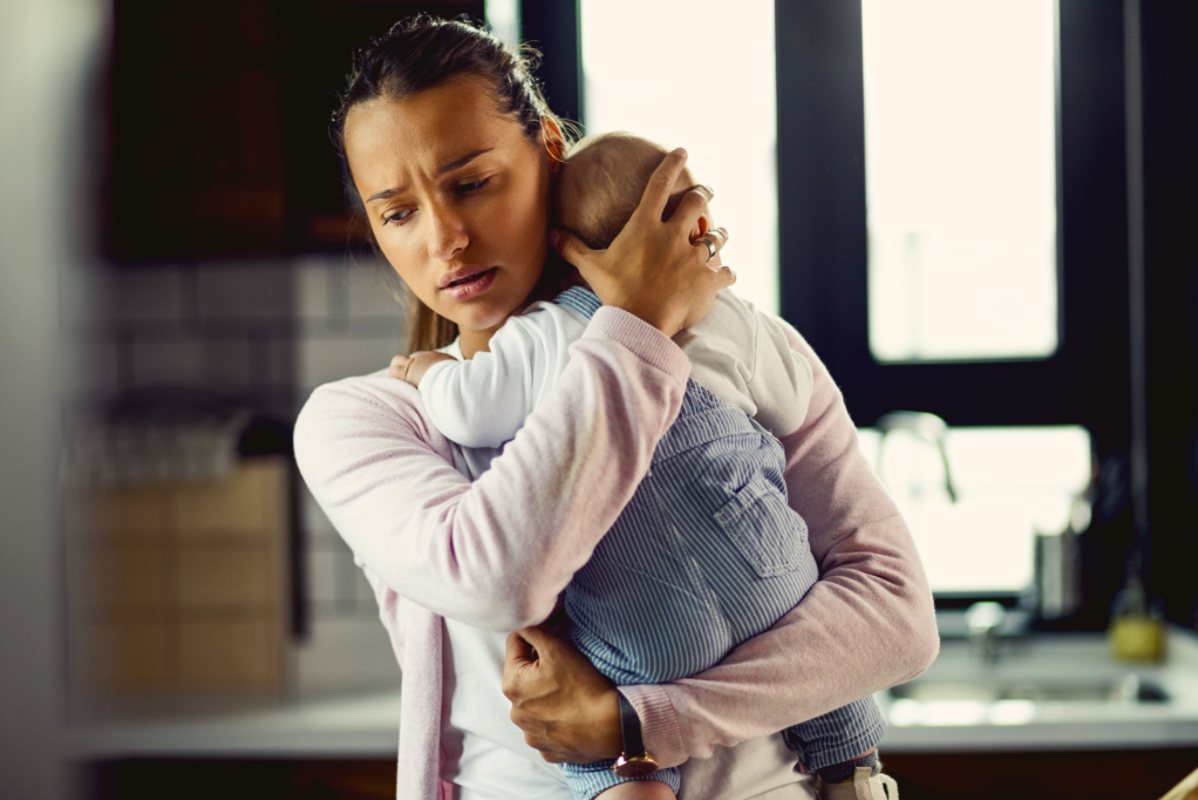Welcoming a new life is an extraordinary journey, but it’s not without its challenges. Amidst the whirlwind of emotions that come with motherhood, one crucial aspect often overlooked is postpartum mental health. At the Motherhood Center in Houston, Texas, we understand the nuances of this journey, offering unwavering support to new mothers and families.
It’s important to note that while we’re not a medical facility, we’re dedicated to providing comprehensive resources for families, expectant mothers, and little ones. In this guide, we’ll explore the depths of postpartum depression, providing insights, information, and compassionate guidance. Our goal is to help you recognize the signs, understand its effects, and learn effective coping strategies. You’re not alone on this journey – for over 20 years, Motherhood Center has been a pillar of support, offering resources and services to nurture both physical and emotional well-being.
So, let’s embark on this exploration together, shedding light on a topic often shrouded in silence. With the tools and knowledge we provide, you can navigate the complexities of postpartum mental health and embrace the joys of motherhood with confidence.
Defining Postpartum Depression
Welcoming a new life into the world is undoubtedly one of the most profound experiences a woman can go through. The journey of motherhood is filled with tender moments, awe-inspiring discoveries, and an overwhelming rush of emotions. However, it’s important to acknowledge that this journey also comes with its share of challenges, and sometimes, these challenges manifest in ways that might catch us off guard.
Distinguishing Normal Emotions from Depression
The initial days after childbirth are often referred to as the “baby blues.” It’s natural for mothers to experience mood swings, fatigue, and feelings of being overwhelmed during this period. However, there’s a fine line between these transient emotions and something more serious: postpartum depression. Postpartum depression goes beyond the usual fluctuations in mood and can have a significant impact on a mother’s ability to function and bond with her baby.
The Prevalence of Postpartum Depression
Postpartum depression is far from a rare occurrence. In fact, it’s a widespread condition that affects a significant number of new mothers. This condition doesn’t discriminate based on factors like age, race, or socioeconomic status; it can affect anyone. While there’s no single cause for postpartum depression, it’s often attributed to a combination of hormonal changes, emotional adjustments, and external stressors.
Recognizing the Signs and Taking the First Step
It’s crucial for both mothers and their support systems to be well-informed about the signs of postpartum depression. By understanding the red flags, we can ensure that new mothers receive the care and support they need during this delicate period. It’s not a sign of weakness to ask for help; rather, it’s a testament to a mother’s strength and her commitment to her well-being and that of her child.
Signs and Symptoms
As the sun rises on each new day of motherhood, it brings with it a range of emotions – from wonder to weariness. Amidst this spectrum of feelings, there exists a shadow that deserves attention: postpartum depression. Understanding the signs and symptoms of this emotional challenge is pivotal in extending a supportive hand to those who need it most.
Unmasking the Emotional Red Flags
Postpartum depression doesn’t always manifest in a conspicuous manner. Instead, it often lingers in the subtle shifts of a mother’s emotional landscape. Feelings of overwhelming sadness, persistent anxiety, and an unshakable sense of hopelessness can gradually seep into daily life, clouding the once-brilliant moments of joy.
Withdrawal from activities that were once sources of pleasure, detachment from loved ones, and an overpowering feeling of guilt despite a mother’s best efforts are all indicators that something deeper might be at play. Additionally, fluctuations in appetite and sleep patterns can further underscore the presence of postpartum depression.
Beyond the Mind: Physical Symptoms
The reach of postpartum depression extends beyond emotional well-being, making its presence known through physical manifestations as well. Fatigue that transcends the typical exhaustion of new parenthood, headaches, and even unexplained aches can be intertwined with this condition. Moreover, the inability to concentrate and make decisions, which is commonly brushed off as “mom brain,” can take on a more pronounced and distressing form in the context of postpartum depression.
It’s important to note that these symptoms might not emerge all at once, and their severity can vary. While experiencing some of these signs doesn’t automatically indicate postpartum depression, it does warrant attention, self-compassion, and possibly seeking support.
Risk Factors
As the intricate experience of motherhood unfolds, it’s essential to recognize that not all threads are equally weighted. While the journey is unique for each woman, certain factors can contribute to a higher susceptibility to postpartum depression. By understanding these risk factors, we can better support and empower new mothers on their path to emotional well-being.
Hormonal Changes and Emotional Vulnerability
The hormonal cascade that accompanies childbirth is a marvel of nature, orchestrating a symphony of adaptations that support a new life. However, this hormonal dance can also lay the groundwork for emotional vulnerability. Fluctuations in estrogen and progesterone levels, which plummet after childbirth, can influence mood regulation and contribute to the emergence of postpartum depression.
The Role of Social Support
The journey into motherhood is not meant to be traveled alone. Adequate social support is a cornerstone of emotional well-being during this transformative time. The lack of a strong support network or strained relationships can heighten the risk of postpartum depression. The absence of a reliable and compassionate space for mothers to share their experiences and feelings can amplify feelings of isolation and distress.
Personal and Environmental Factors
A myriad of personal and environmental elements can also come into play. A personal history of mental health challenges, a past experience of depression, or even a family history of mood disorders can elevate the risk of postpartum depression. Additionally, external stressors such as financial pressures, relationship difficulties, and unexpected life events can contribute to the emotional weight a new mother carries.
Addressing Misconceptions
It’s important to dispel the misconception that postpartum depression arises solely from a woman’s inability to cope with the demands of motherhood. The truth is far more nuanced. Postpartum depression isn’t a reflection of weakness; it’s an interaction between biological, psychological, and environmental factors that can impact anyone.
Effects on Mothers and Families
The journey of motherhood is a mix of beautiful moments and hurdles to overcome. In this journey, postpartum depression can cast a shadow that affects not only the mother but also the entire family. Understanding the effects of postpartum depression is essential in crafting a compassionate response and fostering healing within families.
The Emotional Strain on Mothers
Postpartum depression casts a long shadow over a mother’s emotional landscape. The joy that should accompany new motherhood can be eclipsed by feelings of sadness, guilt, and a sense of detachment. These emotions can create a rift between the mother and her infant, affecting bonding and potentially influencing the baby’s emotional development.
The physical demands of caring for an infant can amplify the weight of postpartum depression. The exhaustion that comes with sleepless nights and round-the-clock caregiving can exacerbate feelings of despair, making the journey even more challenging.
The Impact on Family Dynamics
Postpartum depression extends its reach beyond the individual, affecting the dynamics of families. Partners, children, and even extended family members can experience the tremors of this emotional earthquake. The altered emotional state of the mother can strain relationships, leading to misunderstandings and heightened tensions.
The Importance of Timely Intervention
Recognizing the signs of postpartum depression and intervening in a timely manner is not just an act of kindness; it’s a step towards preventing the cascade of effects that can permeate every aspect of family life. When a mother receives the support and treatment she needs, the healing ripple effect can replace the destructive one, creating a safe haven for both her and her family.
Seeking Help and Support
In the intricate dance of motherhood, sometimes the steps falter, and the music wavers. Postpartum depression can cast a shadow, but seeking help and support can bring back the light. Understanding when and how to reach out is an essential stride on the path to healing.
Reaching Out to Healthcare Providers
If you suspect that you or a loved one might be experiencing postpartum depression, the first step is to connect with a healthcare provider. This could be an obstetrician, a general practitioner, or a mental health professional who specializes in maternal well-being. These professionals can assess the situation, provide guidance, and recommend appropriate treatments or interventions.
The Role of Support Groups
Support groups can be a lifeline for women navigating the challenges of postpartum depression. These groups provide a space to share experiences, exchange advice, and receive encouragement from others who understand the journey. The sense of camaraderie can help combat feelings of isolation and remind you that you’re not alone on this path.
Motherhood Center’s Mama Circle, for instance, is a beacon of support for new mothers. This class goes beyond being just a postpartum support group – it’s a nurturing space where topics vital to new mothers are discussed. From communication and stages of play to managing parent anxiety and returning to work, Mama Circle covers an array of relevant subjects. It’s not just a group; it’s a gathering of kindred spirits, meeting every Monday from 11:00am to 12:00pm.
Empowering Loved Ones to Help
If you’re a friend, partner, or family member of someone experiencing postpartum depression, your role is essential in offering support. Listening without judgment, being patient, and encouraging professional help when needed can make a world of difference. Your empathy and understanding can be a beacon of hope in moments of darkness.
Taking the First Step
Seeking help isn’t a sign of weakness; it’s a courageous step toward regaining emotional well-being. Remember, postpartum depression is a challenge, but it’s one that can be overcome with the right guidance and support. Whether through healthcare professionals, support groups like Mama Circle, or loved ones, the path to healing begins with taking that first step.
Coping Strategies
In the symphony of motherhood, finding moments of harmony amidst the challenges can feel like a delicate dance. Coping with postpartum depression requires a unique set of strategies, each designed to restore balance and foster emotional well-being. Let’s explore these strategies, including how Motherhood Center’s offerings like massage spa services, yoga classes, and Mama Circle can provide solace along the way.
Embracing Self-Care Rituals
Self-care is not a luxury; it’s a lifeline. Carving out time for yourself, even in the midst of demanding responsibilities, can work wonders for your emotional health. Simple practices like meditation, deep breathing, and journaling can help you reconnect with your inner self and cultivate a sense of calm. Motherhood Center’s massage spa services offer a gentle oasis where tension melts away, allowing you to replenish both body and mind.
Finding Solace in Movement
Physical activity is a powerful antidote to emotional strain. Engaging in regular yoga classes, for instance, can help release stress, boost mood, and foster a sense of well-being. Yoga not only nurtures your physical body but also encourages mindful presence and self-acceptance. The guided sessions provide a nurturing space where you can connect with your body and your breath, fostering emotional resilience.
Connecting through Mama Circle
Motherhood isn’t a solo journey – it’s a collective experience. Motherhood Center’s Mama Circle is a valuable resource that offers both support and community. This postpartum support group is a safe haven where you can openly share your thoughts, challenges, and triumphs with fellow mothers who understand your journey. The diverse topics covered, from communication and sleep practices to managing parent anxiety, provide a holistic toolkit for navigating the complexities of motherhood.
Unveiling the Power of Professional Help
Coping strategies are essential, but they’re not a substitute for professional support. If postpartum depression feels overwhelming, seeking guidance from mental health professionals is a crucial step. Trained therapists can offer tailored strategies, helping you navigate the intricacies of your emotional landscape and develop a personalized toolkit for managing postpartum depression.
Motherhood Center’s Approach
At Motherhood Center, we understand that the journey of motherhood is an intricate tapestry woven with joys, challenges, and moments of self-discovery. While we are not a medical facility, our commitment to holistic well-being runs deep. Through a variety of resources and services, we strive to provide mothers with the tools they need to navigate the beautiful yet demanding journey of motherhood.
Prenatal and Parenting Education
Empowerment begins with knowledge. Our education classes are designed to equip expectant and new mothers with essential information and skills to confidently embrace their roles. From prenatal education that prepares you for childbirth and breastfeeding to parenting classes that guide you through the nuances of early parenthood, our offerings ensure you’re well-prepared for the journey ahead.
The Healing Touch of Massage Spa Services
Self-care is a cornerstone of emotional well-being, and our massage spa services offer a haven where you can unwind and rejuvenate. The therapeutic touch of skilled professionals can alleviate tension, foster relaxation, and create a space where you can recharge both physically and emotionally.
Nurturing Body and Mind through Yoga
Our nurturing extends beyond the body to the mind and spirit. Yoga classes provide a safe space for you to engage in gentle movement, mindfulness, and self-compassion. Through yoga, you can find moments of tranquility and connection, building emotional resilience as you navigate the challenges of motherhood.
Doula Services: Guiding You with Compassion
Our doula services offer unwavering support during the transformative journey of childbirth and early parenthood. With compassionate guidance, our doulas provide emotional support, information, and comfort to help you navigate the intricacies of bringing a new life into the world.
Finding Comfort in Childcare Support
Balancing the demands of motherhood and daily life is a delicate act. Our services extend to childcare support, helping you find reliable and nurturing care for your little ones. This assistance allows you the space to focus on your own well-being and responsibilities while ensuring your child’s safety and happiness.
Mama Circle: A Haven of Connection
Motherhood can be an isolating journey, but you’re never alone at Motherhood Center. Our Mama Circle is a space where you can connect with fellow mothers, share experiences, and receive support in a non-judgmental environment. Through open discussions and guided conversations, Mama Circle empowers you to navigate postpartum challenges with a community of kindred spirits.
While we’re not a medical facility, our holistic approach is anchored in empathy and understanding. By offering a comprehensive range of resources, services, and support, Motherhood Center aims to be your partner in every step of the motherhood journey.
Conclusion: Embracing the Journey, Fostering Healing
The journey of motherhood is a mosaic of emotions, experiences, and growth. Within its intricate landscape, postpartum depression can cast shadows, but it’s important to remember that you are never alone on this path. Understanding the signs, seeking support, and embracing coping strategies are essential steps toward regaining emotional well-being.
At Motherhood Center, we stand as a beacon of support for you and your family. While we are not a medical facility, our holistic approach is designed to nurture every facet of motherhood. From education classes that empower you with knowledge to massage spa services and yoga classes that provide solace, our offerings are crafted to guide you toward healing and resilience.
Our Mama Circle offers a unique space where you can find connection, understanding, and guidance from fellow mothers who share your journey. Our childcare services provide the support you need to balance your responsibilities, and our virtual classes ensure that you have access to resources even from the comfort of your home.
Your journey matters to us, and we invite you to take that courageous step towards healing and connection. Contact Motherhood Center today to learn more about how Mama Circle, our childcare services, or virtual classes can be your pillars of support. Together, we navigate the challenges, celebrate the triumphs, and empower each other to embrace the transformative journey of motherhood.
FAQs
What is postpartum depression, and how is it different from the “baby blues”?
Postpartum depression is a more profound and persistent emotional challenge than the “baby blues,” which are common mood fluctuations after childbirth. Unlike the temporary nature of the “baby blues,” postpartum depression involves persistent feelings of sadness, and hopelessness, and has a significant impact on daily life.
Who is at risk of developing postpartum depression?
Postpartum depression can affect any new mother, regardless of age, background, or circumstances. Factors like hormonal changes, personal history of mental health issues, and lack of a strong support network can contribute to the risk.
When should I seek help for postpartum depression?
If you’re experiencing persistent feelings of sadness, anxiety, or a lack of interest in daily activities, it’s important to seek help. If these emotions are interfering with your ability to care for yourself or your baby, reach out to healthcare professionals or support groups for guidance.
Can postpartum depression affect my relationship with my baby?
Yes, postpartum depression can impact the mother-infant bond. Feelings of detachment and a sense of being overwhelmed might affect your ability to connect with your baby. However, seeking help and support can greatly improve your emotional well-being and the bond you share with your child.
How can Motherhood Center’s Mama Circle help with postpartum depression?
Motherhood Center’s Mama Circle offers a safe space for you to connect with fellow mothers facing similar challenges. Sharing experiences, learning from one another, and receiving guidance can help combat feelings of isolation and offer valuable coping strategies. It’s a community where you’re understood and supported on your journey to healing.






